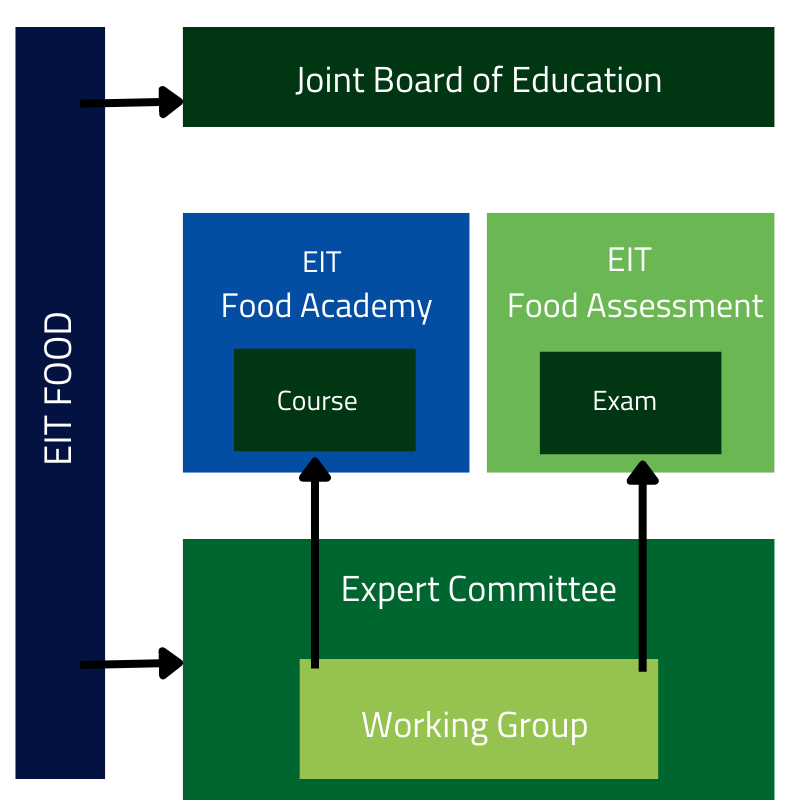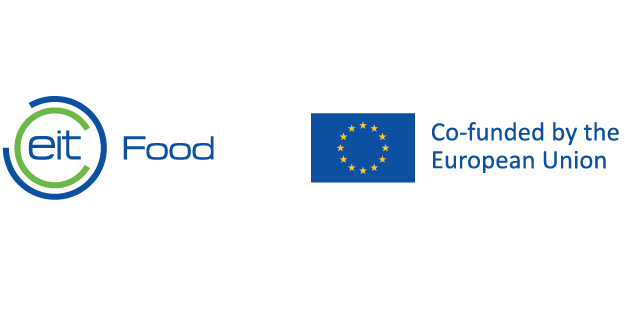How it works
Independence of EIT Food Assessment
Our ambition is to offer our customers teaching and certification at the highest level. Therefore, we strictly separate teaching and certification to guarantee impartiality, objectivity and fairness. As it is also prescribed by ISO 17024 for certifications. For this reason, EIT Food Academy is responsible for teaching and EIT Food Assessment for examination and certification.
The content of the teaching and the examination is created, supervised and updated by the corresponding working group of the Expert Committee. The Expert Committee is composed of independent experts in the respective field of activity.
EIT Food Assessment is advised and supervised by the Joint Board of Education. This intervenes, for example, if there is an appeal against the certification decision, EIT Food Assessment can not process due to partiality.
Structure

Guidelines
EIT Food Assessment is a body based at the Knowledge and Innovation Centre EIT Food. As part of the European Institute of Innovation & Technology Food, we are traditionally committed to quality, research and innovation. With our customer orientation, expertise, independence and impartiality, we are an attractive business partner for all interested companies, institutions and authorities. We ensure non-discriminatory access to the services of the EIT Food Assessment for all customers.
The customer is at the centre of all efforts. Therefore, the quality of our services is understood from the customer’s point of view. It encompasses satisfaction with our certification, monitoring of certificates and other services. We ensure transparent, comparable and independent proof of skills at the state of the art in science and technology and increase the labour market attractiveness of our individual clients.
The definitions of responsibilities and processes for all quality-relevant activities, as well as their monitoring for effectiveness, are documented in the Quality Management Handbook (QMH). The QMH is binding for all persons directly or indirectly involved in the provision of services by EIT Food Assessment. The QMH applies without restriction to all procedures of EIT Food Assessment.
The activities of EIT Food Assessment are not subject to any instructions from the EIT Food or other authorised representatives but take place free of instructions and independently exclusively on the basis of the guidelines laid down in the QMH. The certification staff of EIT Food Assessment perform their duties objectively, impartially and fairly. All processes are continuously reviewed by the certification staff for the existence of any conflicts of interest.
All persons involved in the certification process are obliged to make conflicts of interest transparent. Doubtful cases are addressed in advance if possible, but in any case as early as possible. This is done by notifying the head of EIT Food Assessment. The head of EIT Food Assessment decides on further measures.
All employees of EIT Food Assessment are bound to secrecy in accordance with the relevant laws and legal bases. Client-specific information that comes to the knowledge of the staff in connection with their work may not be disclosed to third parties (without the prior consent of the publisher), even after leaving the employment of EIT Food Assessment.
EIT Food Assessment as well as its staff are obliged to take appropriate measures (including technical measures) to protect the confidential information of clients from access by unauthorized third parties. This also applies to the assessors and members of the expert committees who are appointed and work on behalf of EIT Food Assessment. The appointment and membership obliges to keep examination questions and means of examination secret from third parties.
All employees of the EIT Food Assessment Certification Authority and persons involved in the certification process sign an appropriate declaration of compliance with the guidelines on impartiality, confidentiality and non-disclosure and management of conflicts of interest.
Expert Committee
A certificate from EIT Food Assessment offers practical, relevant knowledge and a high-quality examination in the certified areas. To ensure this high level of quality, EIT Food Assessment has its own working group of the expert committee for each certification profile. The individual working groups consist of independent experts who represent all relevant stakeholders in the respective certification area. The main task of the working groups is to define the competences, learning objectives, examination questions and tasks to be demonstrated. The working group of the expert committee ensures that the competences and contents taught and examined are practice-relevant and innovative.
Joint Board of Education
The Joint Board of Education consists of independent experts representing various stakeholders in the agrifood sector in the sense of ISO/EN 17024. The structure of this body excludes the dominance of individual interests and ensures its impartiality. The following interested sectors are represented on the Joint Board of Education: Economics, Science, Continuing Education, as well as Clients ((potential) certificate holders).
The Joint Board of Education has the task of monitoring compliance with the quality principles of EIT Food Assessment as described in the Quality Management Handbook and advises the Head of EIT Food Assessment on the formation of the Expert Committees. The Joint Board of Education is also responsible for arbitrations/decisions of/on disputes concerning certification decisions of the Certification Authority.
Complaints & Appeal
If you have any complaints or appeals regarding the certification process or decisions of the Certification Authority, you may address your complaint or appeal in written form, directly to the Head of EIT Food Assessment.
[insert Email Address]
EIT Food Assessment is committed to handling complaints and appeals in a constructive, impartial and timely manner. In addition, EIT Food Assessment must ensure that all data concerning the complainant/appellant and the reason for the appeal are treated confidentially and that the submission, investigation and decision on complaints or appeals do not result in discrimination against the complainant/appellant.
We distinguish between two types, complaints and appeals. An appeal is defined as the request of a client to review his/her certification decision made by EIT Food Assessment. This may occur when the client is of the opinion that he/she meets the certification requirements and yet receives a negative certification decision. Then he/she has the opportunity to appeal and the certification decision will be reviewed again by an independent Arbitration Board.
Everything that is not directly related to the certification decision is defined as a complaint. The complaint, unlike the appeal, is to be understood as an expression of dissatisfaction towards EIT Food Assessment in relation to its activities or those of a certified person; it can be filed by third parties (any person or organization).
If a complaint is not resolved by the head of the EIT Food Assessment or if there is a complaint by employees against decisions made by the Certification Authority, the Arbitration Board shall be convened by EIT Food Assessment to reach a decision.

